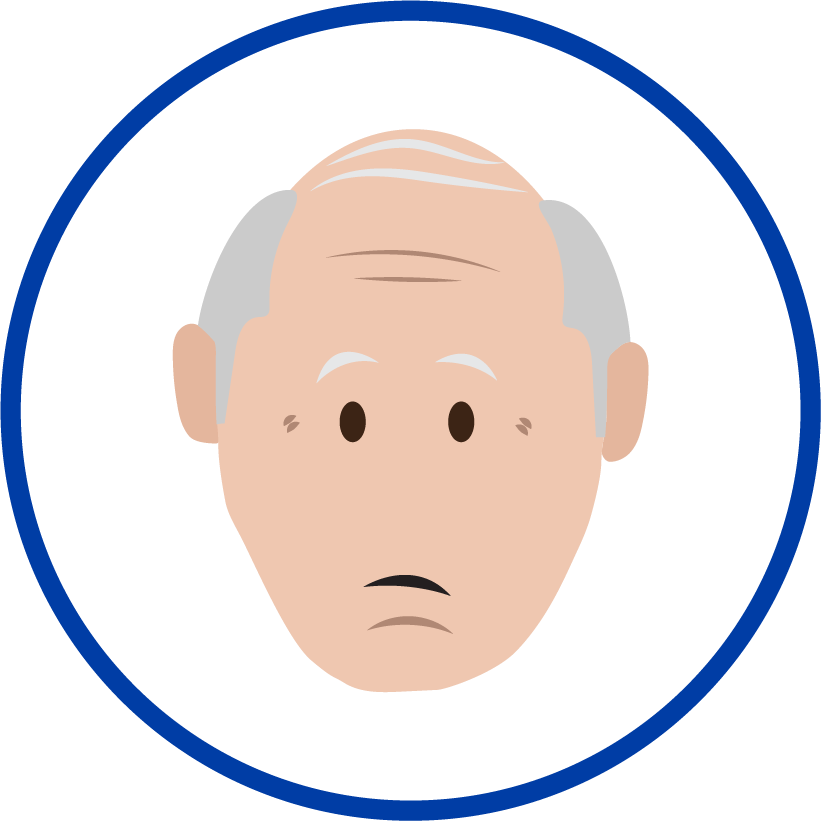2SLGBTQI people living with dementia (PLWD) and their unpaid carers* have unique experiences and needs. How can you, your organizations, and your institutions across sectors come together to enhance care provision and support? Explore the three stories below to see a glimpse of the experiences, perspectives, and needs of 2SLGBTQI PLWD and their carers in Canada. Find where you can better fit into a network of support!
*Taking the lead from community members, we use the term “carer” instead of “caregiver” to better represent the reciprocity within caring relationships.
The following characters are fictional and inspired by the real stories, experiences, and identities that were shared by our research participants.
Meet Asmee and Anne-Marie
Grappling with Change
Asmee (they/she/52 years old) and Anne-Marie (she/her/68 years old) have been life partners for 20 years. The couple is grappling with the changes brought forth by Asmee’s recent diagnosis of young onset dementia. Anne-Marie retired several years ago to help care for her mother, and with Asmee not able to work anymore, they do not have the savings to pay for the outside help they expect they will soon need. Turning to friends for support, they’re finding parallels between coming into living with dementia and previous experiences with coming out about their sexual and/or gender identity. Both experiences brought on a felt sense of loneliness and isolation, with most of their friends still working and caring for their own children, they’re not able to offer Asmee and Anne-Marie more fulsome support.

Meet Jack and Nicole
Non-normative paths to becoming carers
Jack (he/him), a single gay man in his early 70s, is no stranger to care work, having acted as a carer to many of his friends during the AIDS crisis in the 1980s. Now with his diagnosis of dementia, he finds himself with very few people to turn to for support. Many of his chosen family are gone and his family of origin is consistently unsupportive. His friend Nicole (she/her), a trans woman who previously worked with Jack as his accountant, has now taken up the role of being Jack’s primary carer. Many healthcare professionals assume that primary carers are either spouses, offspring, or hired professional support providers. Jack and Nicole must constantly face assumptions or barriers that do not make space for their relationship dynamic.

Collective Experiences
Divided services
There are services that are geared towards 2SLGBTQI communities and services that are geared towards people living with dementia; very rarely do these services recognize and support the unique experience of living and caring within the intersection of dementia and 2SLGBTQI identities. This separation creates barriers to access when it is not guaranteed that 2SLGBTQI people will be recognized or feel safe in their participation.

“It is imperative that I feel comfortable with every person on my dementia care team. This includes how they interact with both Nicole and me. As my primary carer, if someone disrespects her identity as a trans woman, they are also disrespecting me.”
“I can’t tell you how many times I’ve been asked, Is this my mom? This is the presumption… it is the presumption at the dentist, it’s the presumption at the hospital, it’s the presumption everywhere. And, you know, [my partner] visually has aged dramatically in the last two years or three years. And I wasn’t being asked if she was my mum five years ago. But now there’s this presumption and a kind of… As a spouse, I don’t feel as seen as a spouse by the medical system at all. It’s bizarre. Particularly now because she is needing help.”


Here are 8 things that people involved in dementia care work can do:
- Increase recognition of unpaid carers. Check assumptions about who might be an unpaid carer for a person living with dementia. Recognize non-familial carers. Include care for friends, community members, and diverse family members in your workplace leave policies.
- Co-create dedicated support spaces for 2SLGBTQI PLWD and their carers. Start a support group or resource sharing platform.
- Increase funding for direct services working at the intersections of dementia care and supporting 2SLGBTQI communities.
- Expand 2SLGBTQI inclusive dementia care and support services beyond large, urban city centres.
- Create more services and reduce barriers to accessing dementia-related care and support for rural and small-town communities.
- Integrate dementia-focused discussions and education into existing 2SLGBTQI support and social groups.
- Integrate 2SLGBTQI histories and experiences into core course content for healthcare and social services providers, including in dementia care.
- Enable healthcare and social service providers to access ongoing professional development opportunities to better serve 2SLGBTQI PLWD and their carers. Provide training during paid time. Provide training regularly.
So, where do you fit?
Here are some more suggestions for next steps as an unpaid carer, a healthcare professional, an advocacy organization, or institution:
- Read our full research report for more details on how we came to the above recommendations
- Take our 2SLGBTQI Identity and Dementia e-modules
Learning
E-Modules
What can you do to better support 2SLGBTQI people living with dementia?
Egale’s 2SLGBTQI Identity and Dementia e-modules build on the 2SLGBTQI PLWD research, as well as other research and promising practices pertaining to 2SLGBTQI groups and dementia.
Each e-module is free and takes approximately 45-60 minutes to complete.

2SLGBTQI Identity and Dementia: An Introduction for Unpaid Carers
This e-module is designed for anyone providing unpaid care or support to a 2SLGBTQI person living with dementia.

2SLGBTQI Identity and Dementia: An Introduction for Healthcare and Social Service Professionals
This e-module is designed for healthcare providers, social work professionals, and other support personnel specializing in the care of people living with dementia. It may also be of interest to anyone working in homecare, community care, or long-term care settings.
To access the e-modules, please complete the form below. Your email address will be used to send you a private link to the module of your choice and for inviting your feedback on your learning experience. Your email will not be shared or sold to third-parties or used by Egale for purposes not directly related the e-module.
Resources
- Additional Learning Resources for Carers
- Additional Learning Resources for Healthcare and Social Service Professionals
- How to be an Ally to 2SLGBTQI People Living with Dementia
- Nice to Meet You: What I’d like Healthcare and Social Service Providers to Know About Me
- Recommendations for Supporting 2SLGBTQI People Living with Dementia and their Carers through Systemic Change
Acting in Allyship with 2SLGBTQI People Living with Dementia — Guiding Principles for Healthcare And Social Service Professionals
This document synthesizes research findings and recommendations—with considerations from current available research, existing relevant best practices and guidance, and expert opinion—into five guiding principles for better supporting 2SLGBTQI people living with dementia and their primary unpaid carers.
Research Report
Through 2020-2022 Egale partnered with the National Institute on Ageing (NIA) to conduct research focused on better understanding the experiences and perspectives of 2SLGBTQI people living with dementia and primary unpaid carers* for 2SLGBTQI people living with dementia in Canada.
The report discusses the significance of gender and sexual identity in experiences of living with dementia and providing care, the many ways that people become carers for 2SLGBTQI PLWD, and key needs, gaps, and strategies to mobilize networks of support. This discussion is relevant to the aging population, equity and healthcare access, and care work in Canada. Rooted in the research findings, the report provides specific action-oriented recommendations to build and enhance programming, policy, advocacy, and research. The report was co-authored by Dr. Ashley Flanagan and Dr. Celeste Pang.
About the project
This multi-phase research, education, and awareness-raising project responds to gaps in knowledge and a growing need for shared understanding, resources, and critical inquiry related to 2SLGBTQI communities, dementia, and caring in the context of dementia. It addresses two overarching questions: What are the experiences, perspectives, and needs of 2SLGBTQI people living with dementia and their carers in Canada? How can people, organizations, and institutions across sectors come together to enhance care provision and support?
Begun in 2019, project activities are ongoing through to 2023.


This work was funded by a Dementia Community Investment grant from the Public Health Agency of Canada. The views expressed herein do not necessarily represent the views of the Public Health Agency of Canada.